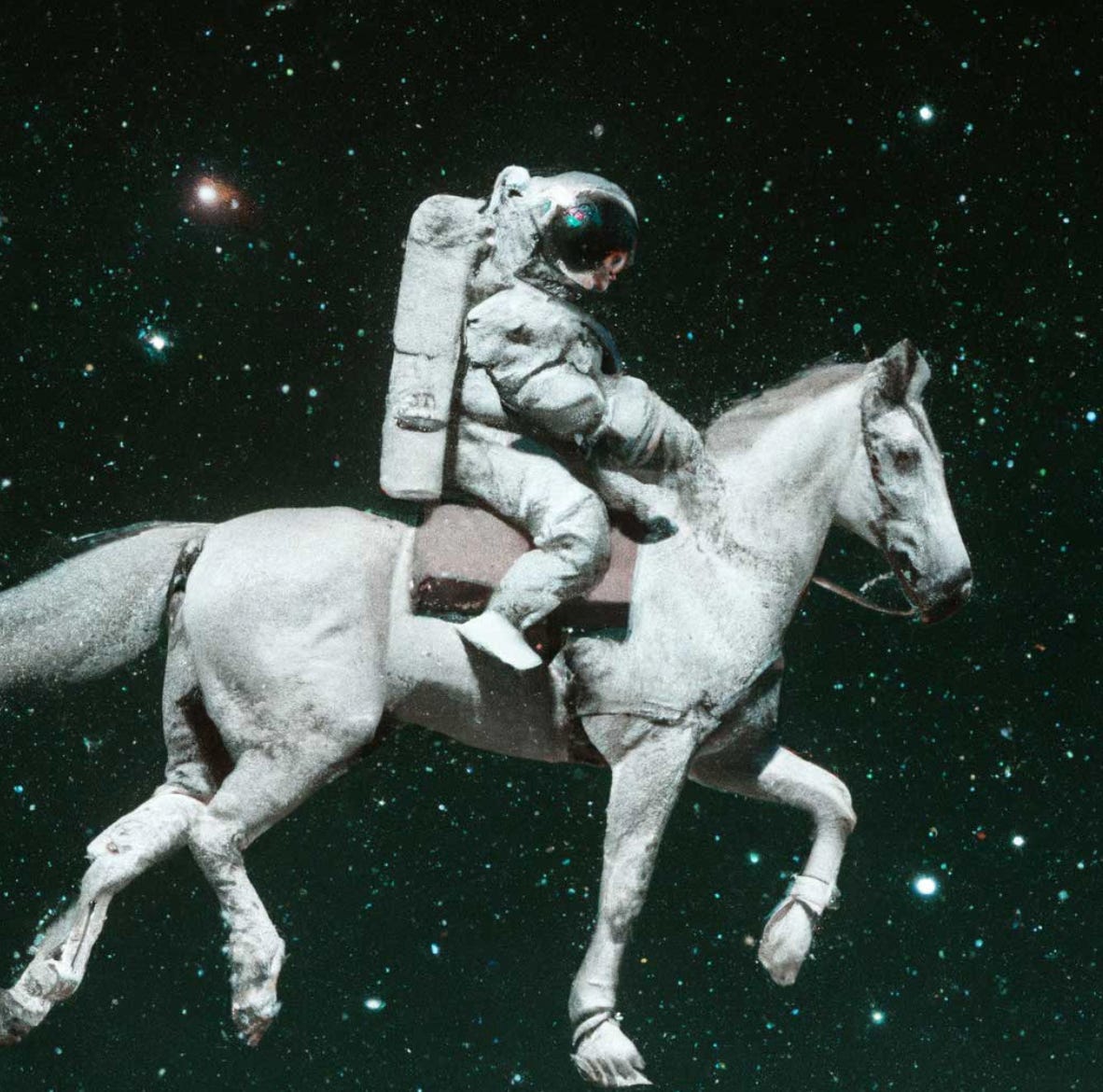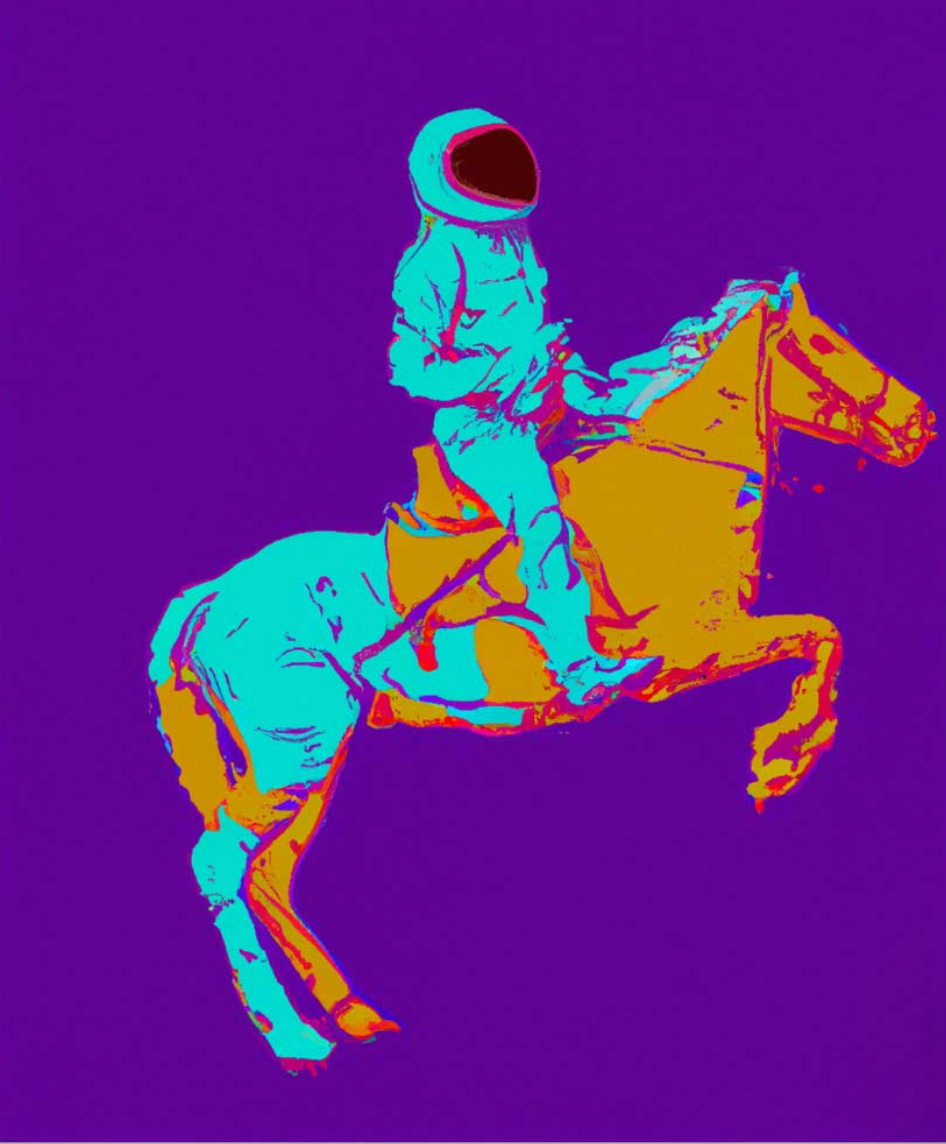Heeeeeeeere’s Dall•E 2! It’s OpenAI’s new image generator, which can create seemingly any image you want based on a text prompt. And I really do mean “any image you want.”
Go to the website to see what it’s capable of. If you don’t want to click around, here’s what it does given only the text prompt “an astronaut riding a horse in photorealistic style”:
And here’s the same picture done with the prompt “an astronaut riding a horse in Andy Warhol’s style”:
So there you go. The good news is that your pictorial imagination is no longer limited by the significant bottlenecks of skill and resources. Humankind has now reached image abundance. The bad news is that commercial illustrators might all be out of a job, and, further, perhaps this is an assault on human dignity and autonomy.
Katherine Dee comes in with a characteristically strident statement of this perspective:


My take on this is, yes and no. Elaborating on this take will require encountering simple questions like, what’s art, what’s literature, and what is a human life well-lived. I’ll do my best.
Does human dignity depend on our being the best at illustrating?
First, let’s forget the economic question here for a second. Let’s just think about what you’re doing if you make visual art, and it’s not your job, and you’re having an existential crisis.
Perhaps you work in a physical medium, and what you love is the craft—feeling the paint, creating the object, knowing it came from your hands. Great, you don’t have to care about this.
Perhaps you don’t even work in a physical medium, but what you love is the personal, spiritual aspect of making images—being lost in the flow state, plumbing your mind, producing a gift, embodying the beautification of the universe. Great, you don’t have to care.
But perhaps what you love, or a core component of your motivation, is the feeling of being the only person who could make this new image. And that’s totally reasonable. Your reaction to Dall•E 2 is probably something like sobs of despair, understandably enough.
This sucks on an individual level. Does it suck on a civilizational level?
To this question, a question. If I’m a novelist born before the written word, has my human dignity been destroyed by time?
I’m being somewhat trollish here. But I think you see what I’m getting at. Human artistic skills are, to an extent, transferable. If you create in the visual realm, and it bothers you that a computer could make a digital rendering of whatever you want to produce, it’s unlikely that you wouldn’t find some other gratifying visual thing to make that an AI couldn’t do yet. This will involve some imagination, and learning some new skills, which might not be ideal. But it’s far from impossible.
If we get to the point where that’s not the case, where AI can produce convincing sculpture with any material, leather-craft, light installations, and weaving, we are not living in a recognizable society. I can’t even think about this anymore. We’re living in the last book of the Three-Body Problem series, where we all dwell in giant fully automated beautiful semi-organic apartment buildings with walls that can play movies. Or we’re all dead. Or we’re cyborgs with DIY bone structure. I cannot possibly guess how humans would find purpose in such a world, although please do write some short fiction about it. (Maybe we’ll have aliens to fight?)
As for the question of literature, I think there’s a similar dynamic going on. GPT-4 will probably be able to write a piece of content I’d sort of thoughtlessly pump out, in like, five years. That doesn’t really duplicate what I do, which is based on sending you transmissions from a perspective. Doing that would require simulating my whole consciousness, generating likely experiences I’d have, their emotional color, making inferences about how I’d describe those experiences, and so on. If you can accomplish this, we’re not living in this world anymore. If that happens in my lifetime, I’m going to have to move on to some modulation of my art that involves more ephemeral, embodied human communication, like live storytelling or whatever. I’ll be the novelist born before the invention of the novel, except at the other end of time.
Are commercial illustrators screwed?
Yeah, probably, largely. And this really really sucks. It’s easy to wave your hands at the mountain of human jobs that have already been automated and note that this doesn’t seem to have stopped humans from finding new things to do with their time. But you’re missing a mood here if you value automation for the sake of human flourishing, but don’t spare a moment to consider the non-flourishing of those swept aside.
Can you really feel the futility that someone would experience in this situation? A big chunk of your whole life has been devoted to mastering this thing. Your brain is filled with a patchwork of millions of minuscule assimilated details that compose your virtuosity. This is, as it should be, a great source of pride. Losing this core component of your identity is probably a sort of mental amputation.
I do hope that the overlords of our new AI future are sparing a thought for this now and again. I suspect they’re not.
In what ways is this good for human beings?
Recently I sent a greeting card to a family member dealing with an illness. I am really bad at drawing, and little better at design, so making my own card was out of the question. At the local Wal-Mart, the least offensive thing I could find was a generic floral print card. At the local yuppie boutiques, I didn’t find anything less offensive. This was, in absolute terms, a somewhat impoverished vocabulary of communication.
Here’s the alternate world, which is fast approaching. With the help of Dall•E 2, I create an image with rich personal significance, perhaps referring to our shared experiences, and print it on card stock at my house, or wherever. It’s a visual poem that conveys my sentiments symbolically, and perfectly complements the words I put down on the next page. I didn’t make it, but that doesn’t totally matter; what matters is that I’m reflecting a shared emotional reality.
Now imagine this for every person you ever want to communicate with, ever. The possibilities of communication through instantly generated personalized images are astonishing.
Are professional visual artists of the non-commercial variety screwed?
I think no. Fine artists would be financially hosed if the art market were about transmissible images. But it isn’t. It’s about ten other things, like, cults of personality, fashion, the scarcity of physical objects, to say nothing of their beauty, etcetera. Again, AI doesn’t really matter here until we have fully automated setups that can lay paint like Rembrandt, and even then, I’m skeptical that the art market won’t find some way to organize itself around human beings.
So is this Satanic?
I think it’s about 40% Satanic. It’s kind of like everything else that’s happened with civilization. It abruptly displaces individuals for the potential benefit of the whole. It uproots some current ways we find meaning, leaving us to scramble for other ones. It either shifts us closer towards a utopia of unlimited agency, or a charnel ground in which we’re all apathetic blobs in our comfortable pods kept happy by an IV drip of designer drugs. I hope for, at the very least, the chance to observe this terrifying future with you.






In A History Of The World In 10 1/2 Chapters by Julian Barnes, there's a chapter about a man who gets into Heaven, the realm with infinite possibilities: no boundaries, no unfulfilled desires. The eternal cycle of indulgence. The protagonist can do anything he could imagine. Food, travelling, sex, meeting Hitler (kind of) so on and so forth, every day for the rest of his life that never ends. But "after a while, getting what you want all the time is very close to not getting what you want all the time." Heaven stops being fun anymore. It becomes normal. Even novelty must not be abundant otherwise we start looking for a different orthogonal or reversed kind of it. The protagonist feels this, too, and chooses to leave Heaven and die permanently. "I dreamt that I woke up. It’s the oldest dream of all, and I’ve just had it," he says.
So, why I wrote all that is I think this applies to literally everything. Even excessive novelty is prone to inflation, and any abundance is satanic in a way :D Anything in abundance quickly becomes “boring”, less stimulating, “not sparking joy” and often we start looking for something new / unique / scarce. Not exactly in the same way, but I think something similar might happen to images or whatever AI can generate.
Although I agree Dall-E 2 will disrupt commercial illustrations industry at least somehow, I think it’s quite different for Art and it’s different for mass-produced vs specially crafted, just like it is now. I think we as artists will find a way to create something that stands out stylistically or with some other qualities, something surprising and stimulating, or at least something that has a mark “made by human” and costs x2 just like “organic” products now.
So, pardon me a repetition, but I want to highlight one of the ground truths of human existence, "after a while, getting what you want all the time is very close to not getting what you want all the time."
P.S. your suggestion on writing a short fiction is very tempting, I can’t think of anything else now.
Cheers
All the styles Dalle creates in are pre existing styles of art that have been developed by humans in the past - is AI going to come up with new styles that appeal to humans do you reckon or is stylistic innovation still a human centric domain?
That pic of the Andy Warhol astronaut looks like what I would think an AI would think is a Warhol-esque style but I wouldn't say it's very aesthetic - why is it centred so weirdly on the page for one thing. There are a lot of blobby looking artefacts where the reins would be. The astronaut's arms aren't defined and kind of join onto the mane in a mess. Warhol's screen prints are neat and sharp.
The artwork is impressive on the whole. I'm impressed with how it looks for AI generated art. But the pencil drawings of horses are almost all horrendous and have weird growths, if you look at them closely. Anyway, those are some of my thoughts, but I am a commercial illustrator, so I'm feeling quite judgy.